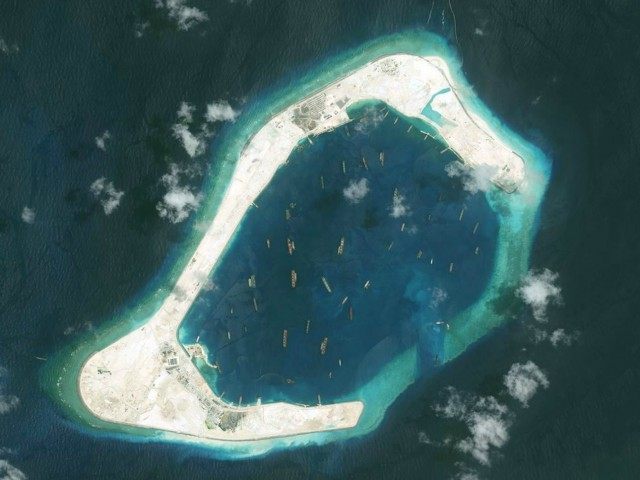The Chinese state-run Global Times newspaper has issued a threat to the Australian government to stay out of the international waters of the South China Sea or face the possibility of having its jets shot down by the Chinese government.
“Don’t test China’s patience by flying close to China’s islands,” the Mandarin-language editorial read, according to a translation by Australia’s ABC News. “Everyone has always been careful, but it would be a shame if one day a plane fell from the sky and it happened to be Australian.”
The newspaper published the editorial following a military exercise conducted by the Australian government in the disputed waters. China claims to control most of the South China Sea, though this claim is widely rejected. Malaysia, Vietnam, the Philippines, Taiwan, and Brunei also lay claim to parts of the sea. The Spratly Islands, contested by the Philippines, and the Paracel Islands, contested by the Vietnamese, have been the most controversial points of dispute in the past several years, as China has begun to construct military facilities in one and forcibly remove civilian fishermen from the waters near the other.
China may also face a challenge from Indonesia, which does not lay claim to any territory in the South China Sea but does claim nearby islands and has expressed concern about the Chinese claim. Indonesia has begun building a military facility in Natuna Island, far from Chinese-claimed territory but still within the South China Sea.
The Royal Australian Air Force conducted a surveillance operation in the region this week. The BBC published audio of the interaction between the Australian aircraft conducting the mission and the Chinese military, which occurred near the Spratly Islands. “We are an Australian aircraft exercising international freedom of navigation rights, in international airspace in accordance with the international civil aviation convention, and the United Nations Convention on the Law of the Sea – over,” the Australian pilot can be heard saying.
The brief exchange has been decreed an attempt to “create trouble” and “create chaos” by Chinese Foreign Ministry Spokesman Hong Lei. “I’d like to reiterate that the freedom of navigation in the South China Sea is out of question. … Countries outside the region should respect other countries’ sovereignty instead of creating trouble.”
Australian Defense Minister Marise Payne has confirmed that such operations will continue, despite protests from China. “It’s actually not an assertion of freedom of navigation, it’s what we do, it’s called Operation Gateway and it’s been underway since 1980,” she clarified, adding, “We always navigate in a very constructive way in the region.”
This dispute is the latest in a string of protests from the Chinese government that other nations are operating in the international waters it illegally claims as its own, and follows the news that satellite evidence shows China is building up three more jet landing strips on artificial islands near the Spratly Islands. China has repeatedly denied that they are militarizing the region, instead accusing the United States of “escalating the situation” by maintaining any presence in the region at all. Most recently, China condemned an agreement between America and Singapore that would allow the former to run spy plane missions in the region out of Singapore. The United States’ “regional militarization does not accord with the joint long-term interests of the countries in this region,” said Chinese Foreign Ministry Spokeswoman Hua Chunying.
Despite claims it is not militarizing the region, the Chinese government has announced a military drill to take place in the South China Sea in the near future. China has also issued new restrictions on the distribution of maps that properly show the division of territories in the South China Sea. Any map that does not show near-complete sovereignty on China’s behalf over the South China Sea “endangers the country’s sovereignty, safety and interests,” officials said this week.

COMMENTS
Please let us know if you're having issues with commenting.